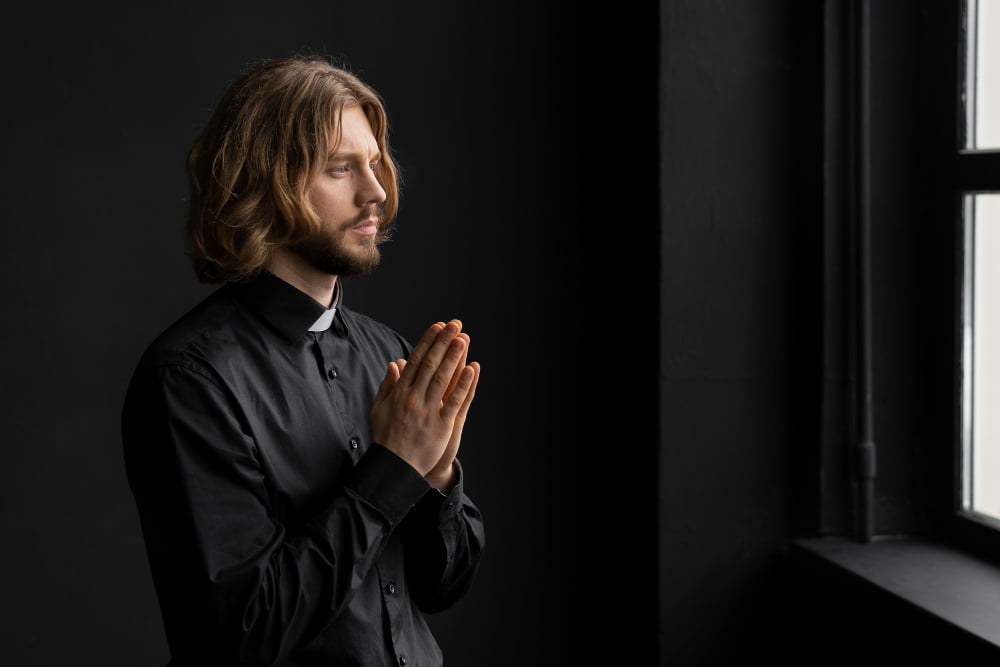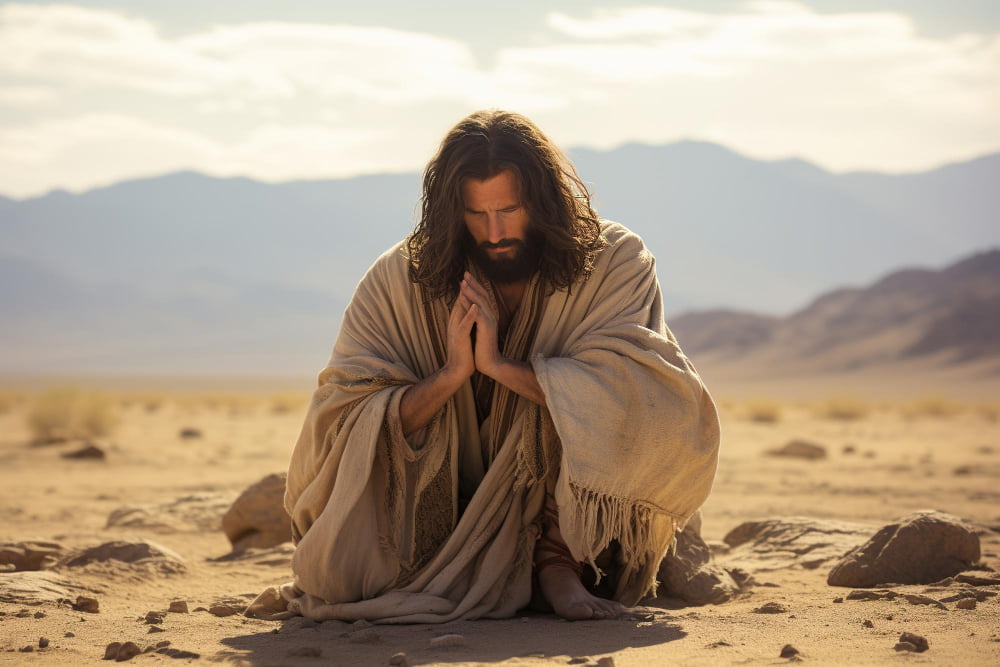While the Bible does not explicitly mention Jesus meditating, it does recount instances when he sought solitude and silence, which can be interpreted as forms of meditation.
Delving into the life of Jesus Christ, one may question whether meditation was a part of his spiritual practices. The New Testament doesn’t directly mention Jesus meditating, but it frequently refers to him withdrawing to solitary places to pray. This act of solitude and prayer can be interpreted as a form of meditation, considering that meditation is often defined as a practice where an individual uses a technique – such as mindfulness, or focusing the mind on a particular object, thought, or activity – to train attention and awareness, and achieve a mentally clear and emotionally calm and stable state.
This article will explore this topic in depth, examining biblical references, historical contexts, and interpretations from various Christian traditions.
Key takeaways:
- Meditation is not explicitly mentioned in the Bible, but Jesus sought solitude and silence.
- Biblical references to meditation highlight intentional focus and reflection on God’s works.
- Jesus practiced elements of introspection, seeking solitude and emphasizing single-mindedness.
- Christian and Eastern meditation have similarities but differ in goals and focus.
- Meditation played a role in Jesus’ life, strengthening him and cultivating wisdom and discernment.
Understanding Biblical References to Meditation

In the Holy Bible, particularly the King James Version, meditation is mentioned over 20 times, especially in the book of Psalms. Divine comprehension and wisdom were sought by several biblical figures through meditative practices. These references often highlighted the contemplative and intentional focus on God’s laws, words, and works.
1. An intentional focus: As seen in Psalm 1:2, meditation is used to describe a deep and intentional focus on God’s laws.
2. Contemplative in nature: The act of meditation, again mentioned in Psalm 63:6, is contemplative, indicating a thought-process favouring reflection over vocal speech.
3. Reflection on God’s works: Psalm 77:12 underlines meditation as a reflective process focused on God’s works and what he has done.
In each of these references, meditation is synonymous with a deep, thoughtful focus on God’s teaching, indicative of a reflective and almost trance-like state. If looked upon closely, there seems to be a parallel drawn between the practices of meditation in today’s world and the biblical references, albeit with a more religious connotation and aim.
Exploring If Jesus Practiced Meditation

While there is no definitive account of Jesus meditating in the way we understand it in modern terms, certain key elements of his life hint that he may have practiced some form of introspection. Firstly, the biblical texts often portray Jesus withdrawing to solitary places, which can be interpreted as attempts to gain inner peace and clarity. This practice aligns with the essence of mindfulness, the purpose of which is to focus the mind.
Secondly, Jesus’ forty days and nights experience in the desert could be seen as an extended meditation retreat. He sought solitude and engaged in fasting, both of which are common in many meditative practices.
Lastly, looking at his teachings, Jesus stressed the importance of single-mindedness and maintaining inner peace, fundamental aspects of mindfulness and meditation. He guided his followers to seek ‘the kingdom of God within you,’ which suggests the practice of introspection.
However, it’s vital to note that interpretations may vary, and these instances should not be equated directly with the Eastern practice of meditation. Instead, they shed light on the possible existence of meditative practices in biblical times. Remember, while we explore these possibilities, respect for diverse interpretations is key to fruitful contemplation.
Comparison Between Christian and Eastern Meditation

Christian meditation often revolves around contemplation of scripture or God’s works, leading to a rich inner life that aligns one’s soul with the will of God. It allows ample room for silence, calm, and attentiveness to the Holy Spirit, encouraging a sense of inner peace and spiritual insight.
On the other hand, Eastern forms of meditation such as Buddhism and Hinduism place a strong emphasis on mind-emptying exercises and the passing nature of thoughts. Techniques such as focusing on the breath or a mantra are used with the aim of achieving a deep state of relaxation, or perhaps a higher state of consciousness, often called enlightenment.
While seemingly forefront, these meditation practices share a lot, with inward focus at their core. Nevertheless, their goals and primary focus can differ significantly, reflecting the philosophical and spiritual diversity of different cultures and traditions. Their applicability and effectiveness can be a highly individual experience, diverging based on personal beliefs, commitments, and aspirations.
Defining the Significance of Meditation in Jesus’ Life

In the arduous life journey that Jesus endured, meditation took a profound role. Here are several notable instances:
1. Jesus’ 40 Days in the Wilderness: As described in Matthew 4:1-11, this is seen as a time of intense spiritual connection and contemplation, a series of meditation punctuated by temptation.
2. The Transfiguration: Found in Matthew 17:1-13, this pivotal moment of spiritual transformation could be perceived as an illustration of advanced meditative union with Divine presence.
3. Garden of Gethsemane: This moment, shared in Matthew 26:36-46, presents Jesus as he seeks solitude to pray and contemplate before his impending crucifixion. This reflects a clear meditative process of deep introspection and acceptance.
Through these moments, an integral connection between Jesus’ resilience, strength, and wisdom with his contemplative practices can be postulated.
The Role of Meditation in Gaining Strength and Discernment

During his 40 days and nights in the wilderness, Jesus may have used meditation as a tool to stay strong amidst trials and temptations. This period was of profound introspection, symbolic of preparation and deep thought, akin to elements of mindful meditation.
1. Through solitude and silence, akin to meditative practices, Jesus found unwavering resilience. This exemplifies the potential power of meditation to derive inner strength.
2. Meditation can foster mental clarity and discernment—two attributes Jesus manifested. He was intuitive about the needs and intentions of others, a wisdom often cultivated through deep, introspective practices like meditation.
3. Biblical passages about Jesus retreating to solitary places to pray subtly suggest a meditation-like practice. These solitary periods might have helped Him maintain a solid connection with His mission and purpose.
4. Similar to practices in meditation, Jesus exhibited mindfulness, being intensely present in every situation. This skill, integral to making wise decisions, is often honed through meditation.
5. The notion of Jesus meditating presents meditation as a tool for understanding and embodying spiritual wisdom. It’s about sifting through distractions to attain the essence of divine truth.
Differentiating Between Prayer and Meditation

Prayer often involves communication with a higher power or deity, typically expressing gratitude, asking for guidance, or seeking assistance. It’s a two-way conversation providing comfort and immediate relief from distress or anxiety.
On the other hand, meditation is a practice of focusing the mind to achieve mental clarity and emotional calm. It’s about training the mind to be present in the moment, letting go of past regrets and future anxieties.
Listed below are some finer aspects of these concepts:
- 1. In prayer, individuals usually seek interaction with divine power, whereas in meditation, the goal could be anything from relaxation to self-realization.
- 2. Prayer usually includes specific words chanted or spoken, while meditation generally involves silence and intense concentration.
- 3. While both activities are used for calming the mind and body, prayer often involves a petition, whereas in meditation, the practitioner strives to empty or focus the mind.
- 4. When individuals pray, they usually have a specific object of focus, such as a deity or concept. Conversely, meditation can be non-object-specific, concentrating on the self or a persistent sound or mantra.
- 5. Prayers can be self-authored, or they can follow traditional scripts, while meditations are more about personal experience and awareness without specific words.
Understanding these distinctions can help us grasp how these practices were applied in the life of Jesus and deepen our understanding of His teachings.
The Potential Benefits of Biblical Meditation

Engaging in biblical meditation can be profoundly rewarding and spiritually uplifting. The benefits are numerous:
- Greater Spiritual Connection: By meditating on holy scriptures, individuals can feel a deeper connection with God, fostering a stronger bond and boosting spiritual growth.
- Peace and Tranquility: Biblical meditation promotes feelings of calm, reducing stress and anxiety. It can help individuals find stillness and peace amidst the chaos of life.
- Enhanced Understanding: Pondering over the teachings in the scriptures can lead to a better comprehension of God’s word. This provides clarity and illuminates one’s spiritual pathway.
- Mindful Living: Such practices nurture mindfulness, enabling individuals to live in the moment, rather than fretting over the past or future.
- Emotional Balance: The practice encourages emotional balance, cultivating love, compassion, and kindness while reducing negative thoughts and feelings.
Thus, biblical meditation can lead to profound spiritual understanding and personal growth, helping cultivate a serene and mindful life.
FAQ
Did Jesus ever talk about meditation?
Yes, in Matthew 6:5, Jesus endorsed practices similar to meditation when he instructed his disciples to pray alone using few words.
Does Jesus want us to meditate?
Yes, based on several passages in the New Testament, Jesus encourages followers to focus their mind on God, which can be interpreted as an instruction for meditation.
What does God say about meditation in the Bible?
According to Joshua 1:8 in the Bible, God encourages meditation on the Book of the Law day and night to enhance understanding of His will.
How to meditate according to Jesus?
To meditate according to Jesus, one should continually inhale with the words “Lord Jesus Christ, Son of God”, and exhale with “have mercy on me”, endeavoring each time to deepen the awareness of Jesus’ presence and compassionate love.
How can we interpret Jesus’s solitude and prayer as a form of meditation?
Jesus’s moments of solitude and prayer can be interpreted as a form of meditation, given that they involve deep contemplation, focused thought, and a search for greater understanding and connection to the divine.
Are there parallels between Christian prayer and mindfulness meditation?
Yes, both Christian prayer and mindfulness meditation involve a deep focus and intentional contemplation, aiming to cultivate a sense of inner peace, clarity, and connection with a higher power or the self.
Can we find references to mindfulness practices in Jesus’s teachings?
Yes, mindfulness practices can be found in Jesus’s teachings, such as when he admonishes followers to stay alert and aware, characteristics that align with the concept of mindfulness.